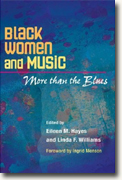Black Women and Music
Eileen M. Hayes & Linda F. Williams, eds.
book reviews:
· general fiction
· chick lit/romance
· sci-fi/fantasy
· graphic novels
· nonfiction
· audio books
· author interviews
· children's books @
curledupkids.com
· DVD reviews @
curledupdvd.com
newsletter
win books
buy online
links
home
for authors
& publishers
for reviewers

 |
Black Women and Music: More than the Blues (African American Music in Global Perspective) Eileen M. Hayes & Linda F. Williams, eds. University of Illinois Press Paperback 280 pages March 2007 |
|
This is an academic survey, so it lacks the vibrancy of a single authored exploration of the subject matter. However, each of the contributors has an important piece of the quilt to set in place.
Gwendolyn Pough takes on the problematic world of “hip-hop divas” whose rants about men can sometimes be interpreted as a paean to liberation but as often seem to be the same old slavish adoration of all things male- and money-dominated. Foxy Brown, for example, proudly proclaims “I’ma stay that bitch,” referring to herself with the very word that gets detractors of the music fuming, and speaks of her willingness to die for her “niggas.” With such images promulgated by black womanhood, one wonders if they are not their own worst enemies in the struggle. Pough suggests that the “fairy tale” dream of the hip-hop generation is a “firmly established patriarchy.” Maria V. Johnson highlights the accomplishment of “Black Women Electric Guitarists,” reminding us that “Blues authenticity requires performers to be Black, old and poor, while gender socialization demands that female performers look young, beautiful, light-skinned, sexy and glamorous.” Blues performers are also expected to have suffered, and how can a younger woman be seen as having suffered enough to grind out the blues? These and other stereotypes make it hard for good women to make it in a man’s world, even if their color is correct for the genre. One of the pieces in the book that I appreciated most was the story of Leontyne Price, “Prima Donna Assoluta,” by Elizabeth Amelia Hadley. Price was an operatic singer groomed from an early age to emulate the stellar success of the great Marian Anderson. Those were different times, when achievements by African Americans were isolated to a few spheres of public life, and singing was one where they were “allowed “to excel. However, singing classical music evoked racial issues, since how could a black woman be the inamorata of a white man onstage or anywhere else? The same year as the Montgomery bus boycott, Price became the first black woman to sing opera on television. Soon afterward, she performed in Il Travatore at the Met, where she received a 42-minute ovation. By 1964 a reviewer was to say, “Operatic directors the world over either build their plans around Leontyne Price these days or wish they could.” Well aware that her success was a triumph for her race, Price told Time Magazine: “I am here and you will know that I am the best and will hear me. The color of my skin or the kink of my hair or the spread of my mouth has nothing to do with what you are listening to.” The revolutionary determination of Price, who often had to make special arrangements for her travel based on the painful exigencies of pre-Civil Rights American culture, is compelling for those who came after. Her modern musical sisters have had to overcome the ravages of poverty, prejudice, broken families, broken promises. All black women will have barriers to surmount until we make our culture color-blind, and that hasn’t happened, nearly, yet. Originally published on Curled Up With A Good Book at www.curledup.com. © Barbara Bamberger Scott, 2007 |
|
|
|
 Click here to learn more about this month's sponsor! |
|
| fiction · sf/f · comic books · nonfiction · audio newsletter · free book contest · buy books online review index · links · · authors & publishers reviewers |
|
| site by ELBO Computing Resources, Inc. | |
 Disc jockey Deborah Smith Pollard examines the work of “gospel announcer” Edna Tatum, whose sonorous voice both speaks and sings her patter, making her words a kind of recitation on themes much familiar to black church-goers, often recalling the mercy of a Savior who “didn’t have to do it, but He did.”
Disc jockey Deborah Smith Pollard examines the work of “gospel announcer” Edna Tatum, whose sonorous voice both speaks and sings her patter, making her words a kind of recitation on themes much familiar to black church-goers, often recalling the mercy of a Savior who “didn’t have to do it, but He did.”